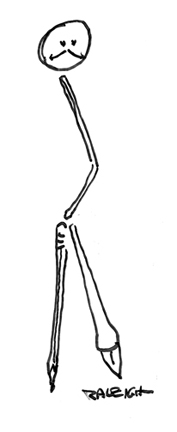Film: Dreams and Visions
 |
ART TIMES Online October 2011
Imagine being visited by a figure with two legs, one a pencil and the other a pen, its body a rusty steel rod, the head a brass disc, mustached and two small crowns for eyes. The bizarre figure identifies itself as Time and proceeds to lecture you on his history of misunderstandings and abuses. Such appears in “Why I Don’t Wear a Watch”, a short story by Louis Bunuel. The filmmaker was known to be a reluctant writer, perhaps preferring his visions in cinematic form rather than in the fixity of words. Nonetheless, he did write — plays, stories, poems, film projects — much of these in his youth and later with collaborators in what was called “assisted writing”. A selection of these writings can be found in An Unspeakable Betrayal. Jean-Claude Carriere, one of Bunuel’s assistant writers and who wrote the forward to the book quotes Bunuel speaking of the cinema as “an almost perfect language of signs”. And indeed, the written pieces in An Unspeakable Betrayal are short, little more than fragments that offer up unsettling images as the one above, brief sketches that in themselves might serve as two or three minute films. In another, “The Pleasant Order of St. Huesca”, there is described a five pound roaster meat walking on the road. The meat runs faster and faster encountering all manner of strange and horrific events. A violent wind storm in a letter to Papin Bello on St. Valero’s Day becomes a spinning vortex in which are seen washing machines, canes and small Formosa islands. “The Giraffe” is a life-size cut-out of the animal and through its spots can be witnessed fantastic scenes as one-hundred musicians playing the overture to Die Meistersinger or an old plaster covered sack.
True-blue surrealist filmmakers and there are many among film’s avant-garde believe that Bunuel abandoned the hermetic tenets of the movement. But certainly for me and many others he remains the unsurpassed absurdist/satirical maker of ever-fascinating films and mesmerizing imagery.
